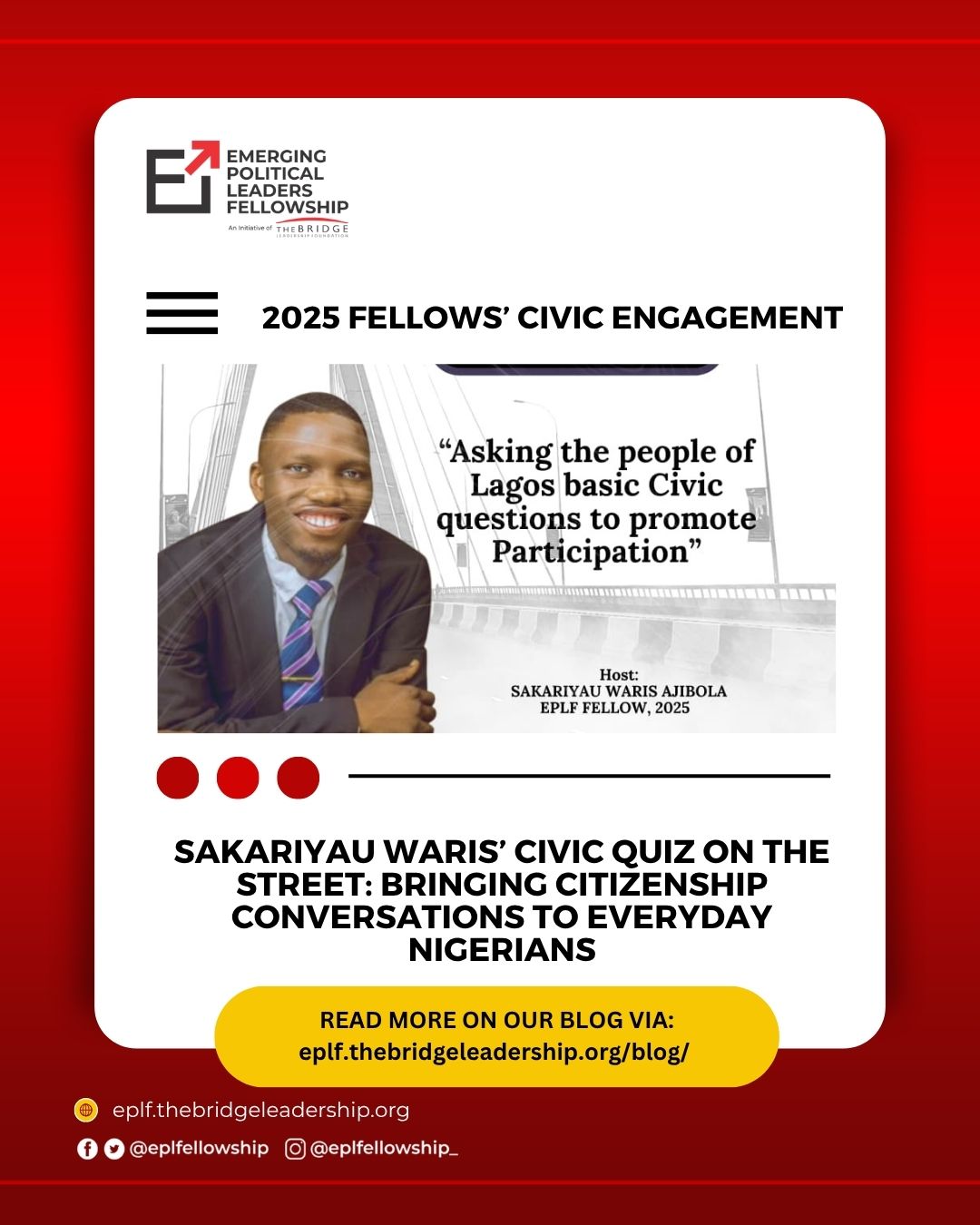Inspired to drive Civic Engagement, a core requirement of the Emerging Political Leaders Fellowship 2025, the Civic Quiz on the Street came alive in Lagos on 19th September 2025, led by Sakariyau Waris, Ajibola, 2025 EPLF Fellow and Vice President of the Cohort, with valued support from CivicHive. The activity engaged 13 direct participants through street interviews and approximately 305 people through on-site interactions and online views. The aim was simple but powerful: to encourage civic participation by taking conversations about citizenship, rights, and responsibilities out of formal spaces and onto the streets where everyday Nigerians live, move, and interact.
The atmosphere was vibrant. Passers-by were at first hesitant to appear on camera, but as the quiz unfolded, they embraced the moment with energy and honesty. From discussions about voter registration to reflections on community responsibility, participants demonstrated that civic knowledge exists but often remains unvoiced in daily life. Each interview recorded became part of a living snapshot of how Nigerians see their role in shaping society.
The impact extended beyond the streets. Online, the first promotional post garnered 306 views, reaching 116 unique accounts and generating 18 interactions on Instagram. Within 48 hours after the event, the recap video and highlights had been viewed about 305 times, proving that digital platforms can amplify street-level conversations. To reward and encourage participation, CivicHive sponsored branded tote bags and jotters, reinforcing goodwill and the value of civic involvement.
Key Outcomes
The Civic Quiz on the Street proved to be far more than a lighthearted street activity; it became a dynamic learning space where ordinary Nigerians discovered that their voices matter. By transforming the street into a civic classroom, the initiative bridged the gap between theory and practice. Participants were not only asked questions about rights, responsibilities, and voting but were encouraged to reflect deeply on how these issues affect their everyday lives. This gave them the opportunity to articulate their opinions in a public setting, something many had never done before.
The immediate outcome was clear: citizens, regardless of age or background, demonstrated a strong willingness to engage when provided with a safe and approachable platform. The on-site audience that gathered spontaneously to watch showed that curiosity and interest in governance are alive within communities, even if they are not always expressed formally. Online amplification also played a key role. Within 48 hours, the recap video had been viewed over 300 times, extending the conversation beyond the physical event and proving that digital spaces can enhance reach and impact. In combining live street engagement with digital visibility, the activity successfully demonstrated that civic conversations can be both grassroots and global.
Lessons Learnt
One of the most important lessons from this activity was the recognition that civic engagement thrives on accessibility but requires deliberate strategies to overcome barriers. A notable challenge was camera shyness, many passers-by were initially reluctant to participate for fear of being judged or misrepresented. This highlighted the importance of building trust in advance, whether through pre-event sensitization or informal, off-camera conversations to ease participants into the process.
Another lesson was the importance of logistics in sustaining attention. Although the activity attracted a good number of onlookers, background noise from the busy Lagos streets occasionally disrupted conversations. Future editions would benefit from portable sound equipment and additional volunteers to help manage the crowd and maintain the flow of discussions.
Most importantly, the experience reinforced the value of blending physical and digital platforms. While street interviews captured authentic, real-time civic expressions, social media ensured that the impact did not end once the cameras were switched off. This dual approach made it possible to engage both immediate participants and wider audiences, confirming that innovative formats like the Civic Quiz can play a vital role in addressing civic apathy.
Next Steps
Looking ahead, the potential of the Civic Quiz on the Street lies in its scalability. With the right support, both logistical and financial, this initiative can grow beyond Lagos to other neighborhoods and, ultimately, to communities across Nigeria. Expanding the quiz would not only amplify civic awareness but also foster inclusivity, giving a voice to citizens in both urban and rural settings.
Partnerships will be crucial for this expansion. Collaborating with civic organizations, schools, and community groups would provide the manpower, trust networks, and resources needed to sustain the program. Regularly scheduled editions of the quiz could create a culture of open dialogue, making civic conversations a consistent part of public life rather than a one-time event.
Additionally, building an online archive of these quizzes could serve as a civic learning resource. Each recorded session has the potential to educate, entertain, and inspire future audiences, creating ripple effects long after the live activity ends. The long-term vision is to see the Civic Quiz become a national model for informal civic education, showing that governance and responsibility are not distant concepts reserved for politicians but everyday matters that every Nigerian has a role in shaping.

